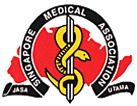
THESMANEWS
Present Issue
Past Issues
Journals
Present Issue
Past Issues
Letters to the Editor

![]() This site is supported by Health ONE
This site is supported by Health ONE
![]()
Dear Sir,
I share your concerns about the ethical issues raised by the connection between the medical profession and the pharmaceutical industry (SMA NEWS, Sept 1997).
Every exercise in continuing medical education (CME) seems to be sponsored by the industry. It is true that I cannot fault the content of these CME sessions but they are always financed by a firm which has an axe to grind. A seminar on headache is funded by a company that sells a drug for migraine, one on mood swings by a firm which is interested in promoting antidepressants. The list is unending.
The private hospitals have joined in the game and are offering doctors the opportunity for learning the hi-tech advances in medicine which these hospitals, of course, are capable of providing.
The pill of knowledge is difficult to swallow unless sweetened by lunches, teas and cocktails before dinner. A more insidious form of advertising is difficult to imagine. This was not always so.
In the early fifties, a group of doctors decided to share experience and knowledge. The backbone of the group was Dr Gwee Ah Leng, Mr Yahya Cohen, the professor of pathology, S Shanmugaratnam and my father, Dr B R Sreenivasan, who, if memory serves me correctly, was the founder president of the SMA. They met on Wednesday evenings at the old Alumni Association building which has since been replaced by the starting point of the AYE. Later, when I was a young doctor, these sessions were held at the path theatre of the Singapore General Hospital to cope with the numbers who attended.
Medical education was, in those days, considered an unending process. There were no incentives, no CME points and after the meeting we went to a roadside hawker for beers and dinner, for which we paid ourselves or treated each other. There was an informality about these occasions which as an ‘oldie’ I find charming and honest. Alas, I cannot say the same about the few CME sessions that I have attended.
With this as a background I turn to the 5-way test you propose.
1. Will it lead to any harm to the patient’s welfare?
The question is unnecessary. If we used a drug or a procedure
that hurt our patients, we would be assassins, not doctors. If there was a risk involved
in the treatment, we should explain it and obtain informed consent for its use.
2. Is it directly or indirectly beneficial to the patient’s health?
If it wasn’t we shouldn’t be considering it at all.
3. Will it impede the patient’s automy to choose his treatment?
I don’t understand this question. Does it mean that a drug will
impair his powers of
decision or does it mean that once on a course he will be committed to
a lifetime of
treatment? Either way it depends on informed consent.
4. Will it be beneficial to the society at large and all parties concerned?
This is a political not a medical question though I realise that in my
country the lines
between politics, commerce and medicine are being blurred. We do, with
his knowledge, what is, as far as we know, good for our patient with his understanding of
what we are doing. It is a one-to-one situation. No other parties are involved. And,
except in wildly infectious diseases ‘society at large’ is not affected by the
process.
5. Will it build better professional integrity and character?
This is irrelevant to therapeutics and God only knows what does. I am
convinced that lectures, seminars and conventions on ethics won’t.
When I went into private practice I called the man who had trained me as a neurosurgeon. He is a man of suicidal dedication and relentless honesty. I asked him what it was that would protect me from operating just for profit.
His answer was simple. He said, “In the dead of night, when you are by yourself,
ask one question. Are you doing it for anything other than your patient? For money, for
fame, to gain expertise, to prove a point. If you can look at yourself and say
‘no’ then go ahead.”
In the end it is individual conscience, that matters. This depends on the example of those
around you. No amount of speechifying or pontication can alter the power of example.
Don’t talk. Walk.
DR GOPAL BARATHAM
.